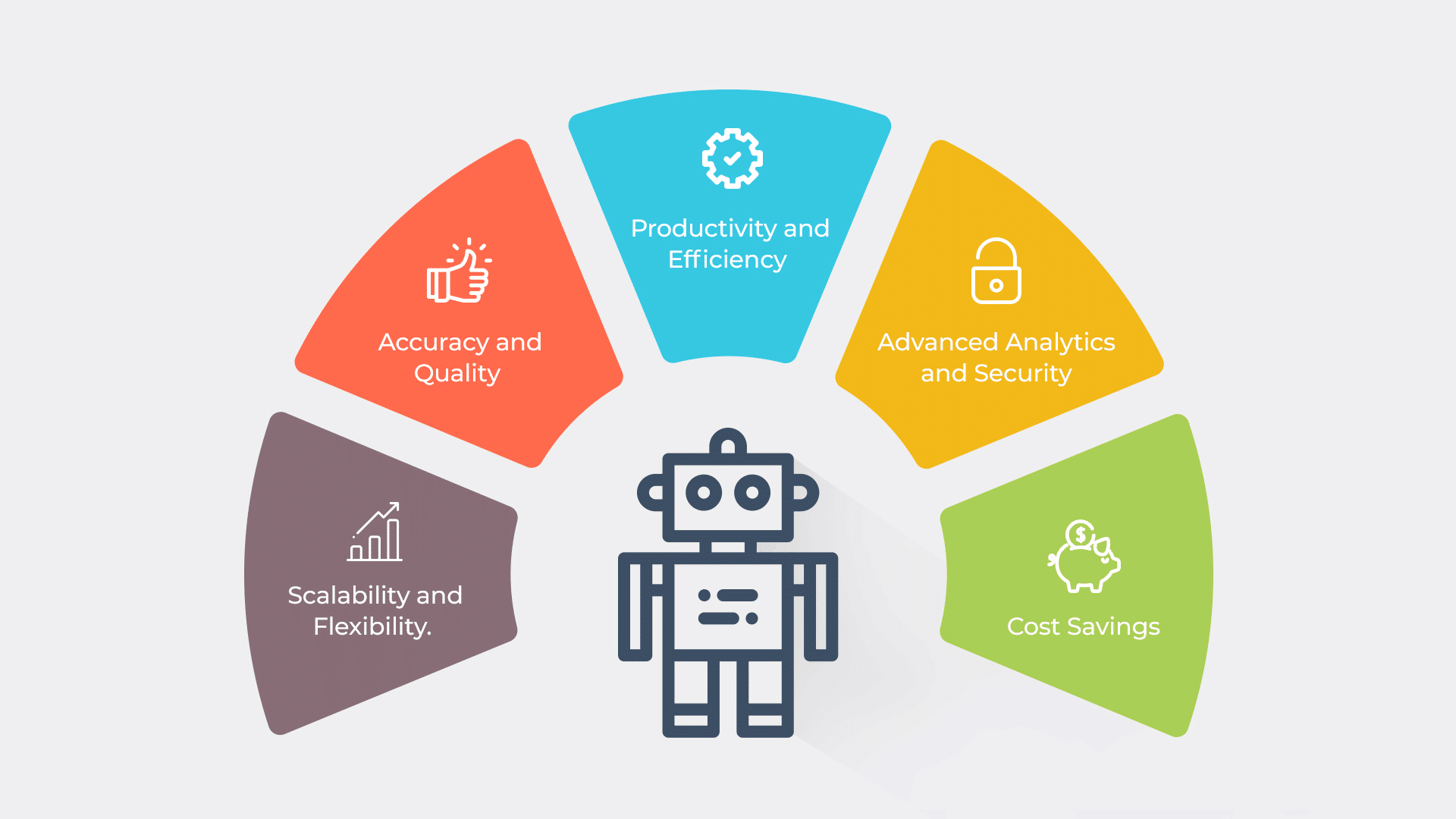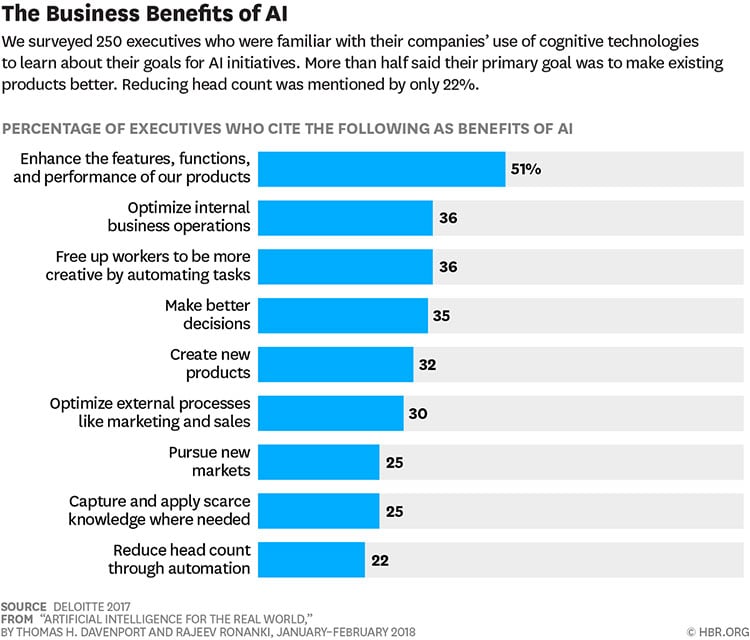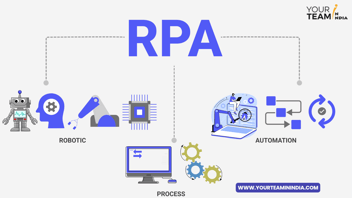In this AI and RPA guide, we’ll address questions like the difference between RPA and AI and what they have to offer your business when rolling out both the technologies, and how every small business can make the most of it.
The Difference between Robotic Process Automation and Artificial Intelligence. RPA is a software robot that mimics human actions, whereas AI is the simulation of human intelligence by machines.
Let’s break it down in plain terms!
RPA Vs AI
The two are the most successful technologies for organizations to attain the firm’s objective: improved customer satisfaction and employee morale with utmost ease.
What is Robotic Process Automation?
RPA is the utilization of software robots to automate all the mundane tasks of the organization. It acts, in the same way, every time. All you need to do is pre-define its role and handle all the mundane tasks that your employees used to do earlier. The only difference now would be that it will be done within a much lesser time than it was done before. All your employees, including your developers, will thank you for bringing in the ease of work in your business.

Most importantly, software robots won’t improvise or recommend you a better way of performing any task. You must know about virtual assistants; RPA is just like them. It lets you offload the repetitive tasks, which consume employee time (are not too complicated) and can save time if automated. RPA can just automate those tedious tasks for you and perform them with utmost efficiency.
What is Artificial Intelligence?
AI is the replication of human intelligence processes using a system or machines. AI processes acquire information and contextual rules to use the information in the best possible way. It uses the context to draw conclusions and self-correct when needed. Simply put, AI has the power to learn from the mistakes and improve at every stage. It learns from the failures and successes.
The most common AI application examples are machine vision, chatbots, speech recognition, image recognition, sentiment analysis, and NLP. AI is the ideal replacement for the human workforce and unattended automation. Artificial intelligence uses structured inputs and develops its own logic.
“The potential of automation is vast. We believe the power of AI can make it almost limitless. And so, we’ve built AI into every part of the UiPath platform. As a result, you can reach new levels of productivity and automate more.”- Daniel Dines, Co-Founder, and CEO, UiPath.

How RPA and AI are Best Deployed for any Business?
Let’s see how RPA and AI help your organizations and deploy to make your business better.
a) Robotic Process Automation is the backbone of the software robots, responsible for interacting with digital systems to replace the human workforce from mundane, non-value chores. RPA can smartly take all those tasks off your plate, that you hate doing in your organization the most.
RPA supports your business in the following ways:
- Copying and pasting data.
- Logging in apps
- Extracting structured content from documents
- Structuring content from business documents
- Connecting to APIs
- Web Scraping
- Manage emails and attachments
b) Artificial Intelligence can be considered as the sibling of RPA. It handles more complex business processes as compared to robotic process automation. AI can make cognitive decisions using large sets of data to forecast potential outcomes. It can even go beyond execution to thinking.
AI supports your business in the following ways:
- Analyzing and understanding documents
- Understanding the conversations
- Processing languages
- Visualizing screens, like your virtual desktops
- Finding processes and tasks to automate them
- Managing unstructured data
Robotic Process Automation vs. Artificial Intelligence/ RPA vs. AI

Now, let’s look at the difference between both the terms more deeply to decide which one is right for you. And, even if both are, how can you rightly implement it for the business chores.
So, how should one know when to roll out both AI and RPA? Well, keep the most complex tasks for AI and regular monotonous tasks for RPA. Remember, RPA will not automate your tasks end-to-end. However, AI has that power.
When to Roll Out RPA and AI?
RPA is needed to clean up your underlying processes to offer a seamlessly integrated framework on top of your already existing systems. And, when you have that foundation ready, you can manually use AI in your core business processes.
AI can easily handle complex tasks, such as:
- Workflows with unpredicted behavior like processes involved in loan defaults and inventory forecasting.
- Processes with unstructured data from different sources like images, videos, articles, emails, and documents. It could be done through email routing, speech-to-text, and invoice extraction.
- Processes that don’t have a defined set of rules, like language translation and buying decisions.
RPA and AI Advantages for Small Businesses

Let’s talk about the prominent benefits of RPA and AI for every small business to know how your business will benefit from implementing these technologies for automation.
Benefits of RPA
- Higher Productivity
RPA robots are entirely focused on certain business tasks. For example, robots can calculate and navigate through the screen in just a few seconds. Just imagine a robot doing the same task in 20 minutes, which takes four hours to complete. That’s just an example of how productivity can be enhanced in any business.
- Improved Efficiency
RPA software doesn’t need a break like humans. They can work 24x7 a day which means you just need to pre-define tasks for the robots, and it will continue to work until you stop the process. Hence, an incessant boost in employee efficiency. Also, RPA needs less time to complete work in volumes.
- Accuracy
Humans are bound to make mistakes, but not robots. They will ensure timely task completion with minimum effort and without even stopping for a minute. Isn’t that what every business needs for outstanding performance?
- Robust Security
In RPA, the bot performs only the single tasks, which means no stress about information leakage from one part to another. Moreover, the data access is well managed, controlled, and documented. Hence, utmost safety can be maintained when using RPA.
- Enhanced Analytics
RPA allows firms to collect data regarding task execution, which can further be used for analytical purposes. Perceptions attained from the analysis can help improve existing processes, which results in better decision-making for the business. In addition, when you can determine the gaps and further streamline them, it enhances efficiency.
Related Read: Best RPA [Robotic Process Automation] Tools
Benefits of Artificial Intelligence

- Review Past Performance
AI gives you access to reviewing your past performance and data to predict the future of your business. You can predict the behavior of customers and prioritize your actions based on these predictions. Hence, a great deal for every company that is trying to boost up the sales.
- Better Customer Management
Automated chats allow businesses to scale their customer engagement and freeing up the employees who need to sit and chat with the customers. In addition, it will enable greater customer satisfaction, which is one of the most important goals of any business. AI supports businesses to understand customer needs, their purchasing patterns and suggest the most relevant services, offers, and rewards.
- Stronger Cybersecurity
The cases of cyber exploits are increasing every year. For complete protection against such events, your business needs AI to protect the data, identity the security vulnerabilities, and take apt actions to keep everything safe from cyber attacks. When you use AI for business processes, you are automating tasks and making your system more secure.
- Supports Salespeople
The sales team is an integral part of revenue generation. With AI technologies, you can coach the sales team to sell better. AI tools can record and transcribe the calls that salespeople make. Your sales team can use AI for analyzing the current strategy, predict the future, understand the gap, and create better sales strategies for higher sales and profits.
- AI Easily Embeds with CRM
CRM embedded with AI can take your customer relationship to the next level of success. With AI, you can quickly gather valuable insights to handle interaction with existing and potential customers. AI can do real-time analysis to provide apt and meaningful recommendations and predictions based on customer data and business processes.
RPA and AI are Essential (It Takes Two to Tango)
After analyzing the benefits of both the RPA and AI, we suggest you implement the combination of both to manage all your structured and unstructured data. It will help you leverage the benefits of both technologies and balances and automates all tasks in your business processes. Also, make sure to hire only the trusted and best RPA and AI developers for your business to bring the results for your business.
At your Team in India, we have a team of RPA experts. If you want to hire Developers or have any questions on what all services we offer at Your team in India– Click here to contact us.




![Best RPA [Robotic Process Automation] Tools](https://www.yourteaminindia.com/hs-fs/hubfs/Imported_Blog_Media/Best-Rpa-Robotic-Process-Automation-Tools-Sep-25-2023-10-20-59-8885-AM.png?width=352&name=Best-Rpa-Robotic-Process-Automation-Tools-Sep-25-2023-10-20-59-8885-AM.png)


